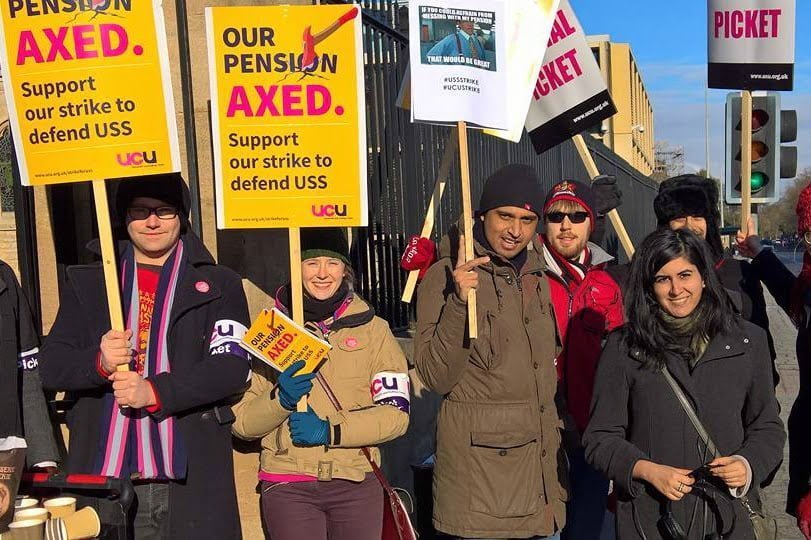Higher education workers are facing attacks on multiple fronts: on jobs, wages, conditions, and pensions. Marketisation and profit are destroying our universities. Workers and students must unite and fight for a socialist alternative.
Workers in Higher Education (HE) – already facing redundancy, pay cuts, casualisation, and risks to their health and safety during the pandemic – have been dealt another blow.
The Universities Superannuation Scheme (USS), a major pension provider for HE workers, is demanding a massive increase in staff contributions – from 30.7% of payroll to a “worst-case scenario” of 56%.
Managers of the USS claim the pension scheme is in a parlous financial state, and that only higher staff contributions can fix it. They are lying.
Strikes and struggles
In 2018, an attack on USS members’ entitlements, based on near-identical claims about the financial fragility of the scheme, provoked a brilliantly militant response from UCU members.
In an energetic and angry period of four weeks, workers went on strike; union membership grew by thousands; an attempted leadership sell-out was rejected by members, who gathered in mass meetings; and the old, conservative leadership was completely discredited.
A new generation of young, radicalised UCU members came to prominence, criticising the politics of the old guard. However, the old leadership of the UCU clung on long enough to endorse an unsatisfactory compromise, which made further attacks on the USS inevitable.
These attacks came the following year, in 2019, in the form of worsening benefits from pension payments.
Again, the UCU balloted for strike action. And the new leadership – under general secretary Jo Grady – linked the pensions issue to disputes about casualisation, pay, inequalities, and workload: the ‘Four Fights’.
However, a further round of strikes in November and December 2019, and again in February 2020, produced disappointing results. Combined with the pandemic, this created a mood of demoralisation.
Staff were exhausted by strike action, the increased workload, and the atomisation and dislocation of life under lockdown – all without any perspective or strategy from the union leadership of how the struggle could be won.
The new attack
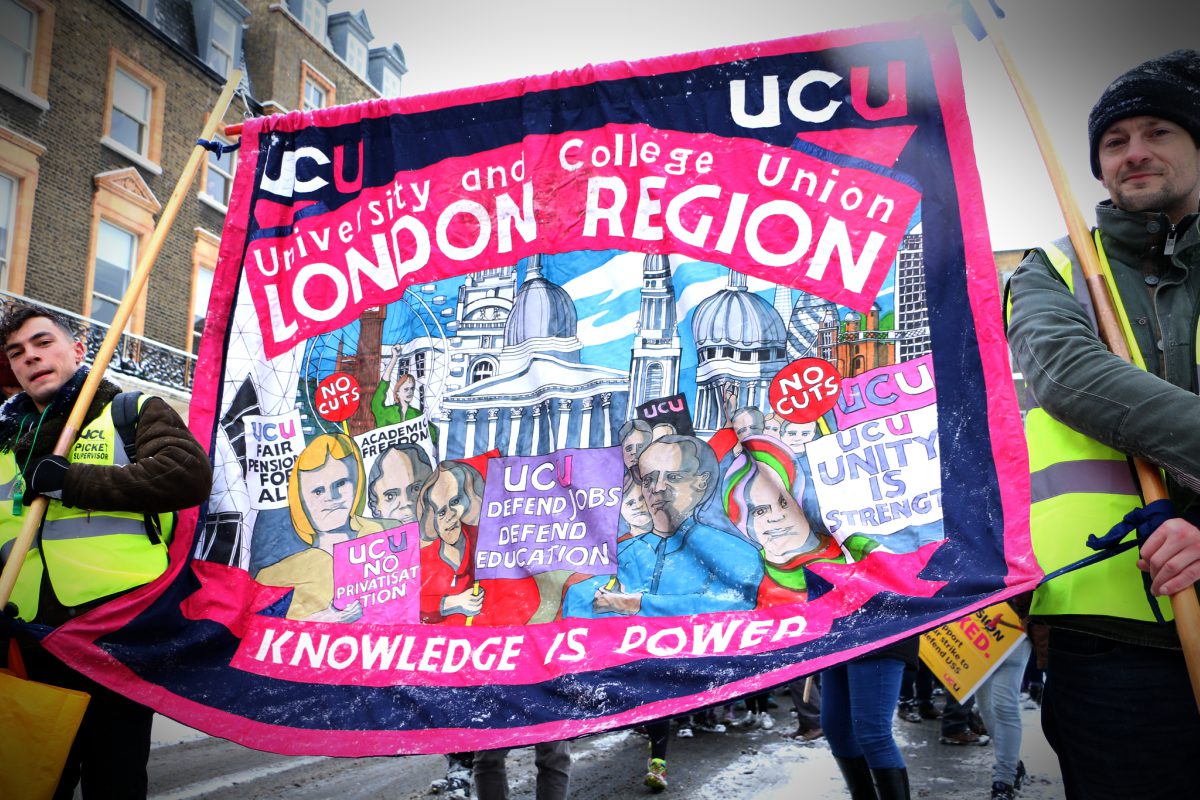
In response, the employers have stepped up their attacks on HE workers, on multiple fronts. And it was only a matter of time before the issue of pensions was put back on the table.
The managers of the USS claim that the withdrawal of Trinity College, Cambridge, from the scheme could precipitate a series of similar, destabilising withdrawals. They also claim that stock market behaviour is making the pension scheme less sustainable.
Even university bosses reject the new valuation by the USS. Just as reluctant to increase their contributions as the workers, the employers say that they want stronger justification from the USS for their extraordinary demands.
The university bosses, however, are not the friends of UCU members in this fight. They are looking after their budgets, which they are perfectly happy to manipulate and misrepresent to justify their own attacks on pay and working conditions.
In fact, the employers’ proposal is just as bad for workers. They say workers should accept a cut in their pension entitlement!
For its part, the leadership of the UCU has pointed out that the managers of the USS are pricing lower-paid and precarious staff out of the scheme, and making a pension unaffordable for many junior members of staff.
This, in fact, is a bigger threat to the sustainability of the scheme than the possibility that other institutions might follow Trinity College and withdraw. After all, Trinity College is in the unique position of being able to afford its own pension scheme.
Origins of the pensions crisis

Once again, the managers of the USS are being unnecessarily pessimistic in their valuation of the scheme – an attitude that has been a common feature of disputes in recent years. The cause of this problem has two aspects: one political, the other economic.
First, governance of the USS is completely undemocratic: it is dominated by unaccountable ‘experts’. Only four of the trustees are appointed by the union; the remaining eight being representatives of the bosses and ‘independent’ appointees of the USS board.
There is no mechanism for workers (or even employers) to hold the scheme’s governors to account. As a result, when the USS managers make valuations that are disastrously incompetent and catastrophically pessimistic, the only pressure workers can bring to bear is withdrawal of their labour.
In short, the political cause of the USS crisis is a malignant system of governance.
Anarchy of the market
Second, the funding of occupational pension schemes leaves workers at the mercy of the stock market.
In recent years and decades, the capitalist class, faced with an aging population and a stagnant economy, has sought to make workers pay by ‘capitalising’ pensions – that is, by tying their outcome to the financial markets.
The result is a chaotic system of pension provision. Instead of the previous setup of ‘defined benefits’, we now have nothing but insecurity and uncertainty, with the money that beneficiaries eventually receive dependent on the highly unstable movements of the market.
In short, the incompetence of the managers of the USS notwithstanding, the economic cause of this pensions crisis is the anarchy of capitalism.
Workers’ control
The UCU must approach the issue of pensions with an understanding of the root causes of the crisis in the USS, and make relevant demands on this basis.
In 2018, the union made the mistake of settling for the establishment of a Joint Expert Panel, which made recommendations to the managers of the USS. These were ignored because, ultimately, control of the USS remains in the hands of the representatives of the capitalist class, who are unaccountable to scheme members.
As a minimum, the leadership of the UCU should demand full democratic workers’ control of the USS.
Complete democratisation of the scheme would require more serious and sobre evaluations of affordability. This would need to be complemented by a similar democratisation of HE institutions themselves. All members should be able to examine the valuation of the scheme and have a say over its direction and structure.
Make the bosses pay!
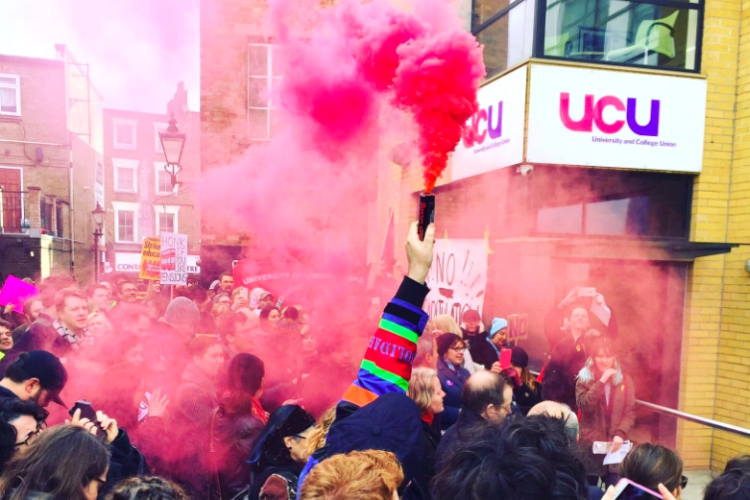
However, it is not enough to simply give workers oversight over a marketised pension scheme. This, in effect, would be asking workers to try and manage austerity, in times when capitalism – inevitably – goes into crisis (like now).
Given the political and economic causes of the USS crisis, the leadership of the UCU must join with the rest of the labour movement and call for a single, universal, state pension system that will provide all workers with genuine financial security and decent living standards in old age.
The money exists in society to provide everyone with a proper livelihood – either as a wage, when in work; or as a pension, in retirement. But whilst wages and pensions are coming under attack, the capitalists are laughing all the way to the bank.
We say: No to pension cuts! Make the bosses pay for this crisis! Fund education through expropriation!
Unite and fight
As the UCU discusses its response to the new attack on the USS, these are the ideas UCU Marxists will be arguing for.
We must fight back against this attack, and link the crisis over pensions to all the other issues that higher education workers face – due to the marketisation of education, austerity, and the crisis of capitalism.
Moreover, isolated strike action will not be enough. We must build for national, co-ordinated strike action across the public sector, and beyond.
Only mass, militant action of this kind can stop this reactionary Tory government in its tracks, halt the employers’ onslaught, and bring about a serious socialist alternative.
Coventry UCU fights back against ‘fire and rehire’
Millie Harvey, Coventry Marxists
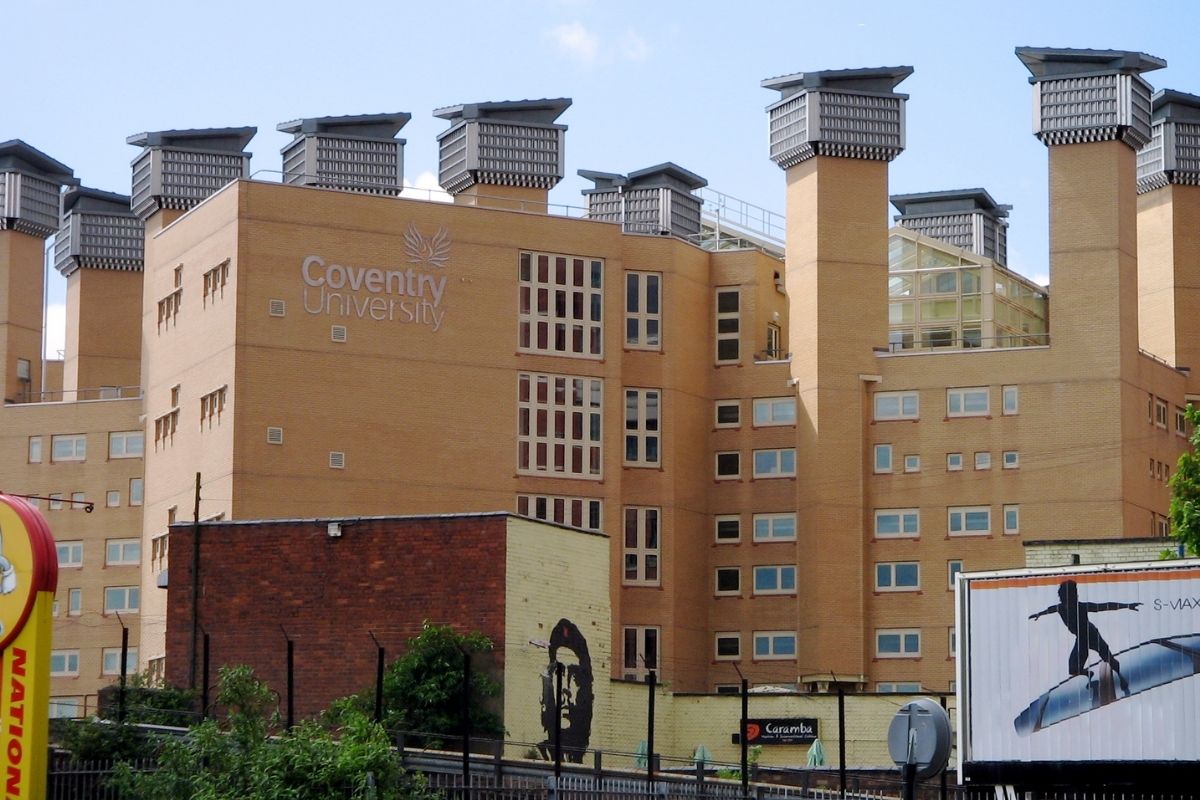
On 31 March, Coventry UCU called an open meeting to mobilise support for a fight back against the university’s ‘fire and rehire’ attacks, which are being carried out under the guise of ‘subsidiarisation’.
80 members of staff, students, and sympathisers attended after the university announced that it would transfer nearly 500 staff to their privatised subsidiary: Coventry University Enterprise Ltd.
This comes directly after more than 100 principal lecturers were made redundant in 2020. Meanwhile, the salaries of senior management have remained above six figures.
Assault and attacks
These recent attacks have especially affected the lowest-paid workers in estates, as well as IT services staff. These workers have been the backbone of the university throughout the pandemic, with IT staff supporting online learning and estates workers taking risks to sanitise the buildings on campus.
Wages and working conditions are being directly attacked, with annual leave reduced; sick pay decimated; inferior pension schemes created; and pay lowered across the board.
All of these not only represent an assault on hard-won gains from past struggles, but also the ruthless determination of management to cut labour costs.
The university has sought to justify all this by pointing to COVID-19. However, these plans were in place long before the pandemic, and are only the latest in a series of attempts to cut wages.
Staff are exhausted with these salami tactics. But the university is deaf to their concerns. As the recent meeting showed, however, UCU members are itching to fight back.
Morale and motivation
Without accountability, the university has demonstrated it will not listen to the complaints of its staff; nor will it take steps to fix the problems subsidiarisation has caused. Instead, they are only concerned with the profit to be made through exploiting its staff, as well as from unsustainable plans such as constructing multiple new student accommodation buildings.
And what are the problems created by the process of slicing up different sections of the university into subsidiaries?
Staff morale plummets, as terms and conditions – as well as wages – come under attack. Experienced staff leave to seek better employment in other universities. Those who remain work to contract, or without enthusiasm.
In the end, it is students who suffer also; for despite the best efforts of all staff to provide the best service possible, it is very hard to motivate students when you are demotivated by the attacks you are under.
End marketisation
The task now is to broaden the struggle. Our strength is in numbers. We need as many students and staff as possible to fight back against university management. And as the recent Coventry rent strike has shown, clear radical demands are what will inspire workers and students to act.
The university can no longer be trusted in the hands of those who place profit over livelihoods. Private outsourcing and subsidiarisation have proven to be detrimental to staff nationwide. We must therefore fight to end marketisation and push profit out of higher education.
Calling for an end of the use of these ‘fire and rehire’ tactics takes a stand not only against the actions of the university, but also against the increasing number of businesses adopting the same strategy.
At the present time Coventry University is leading the way amongst higher education institutions in using these methods to cut labour costs. If they get away with it, other universities will follow suit.
Open the books
An issue which must be addressed with the same intensity is the transparency of income and expenditure within the University. The demand to ‘open the books’ would force the university to justify the inconsistencies in pay between management and staff, as well as expose the unsustainable plans of management to expand the university.
This act of opening the books – to inspection by organised workers in the trade union movement – would show that management are not fit for purpose.
To prevent issues such as subsidiarisation in the future, the university must be run democratically, with representatives from staff and students in charge of the decisions made.
Election processes for the Board of Governors, senior management, and any leadership role should be adopted, with regular consultations and interventions – including the democratic right to recall – if they do not fulfil the role.
Fight for socialism
Only when the workers and students have power within the university can they ensure that management acts in their interests – to defend wages, jobs, and good working conditions.
In the final analysis, however, so long as higher education in general is part and parcel of the capitalist system, it will be eroded and attacked by the ruthless laws and logic of the market.
With capitalism in crisis, these laws dictate that labour costs be slashed, in order to retain profit levels for the bosses.
That is why workers and students must unite and fight for a genuine socialist alternative, where higher education – and the whole of society – is run for the good of the many, and not the profits of a super-rich few.
Leicester UCU: Interview with an HE worker
Deep Sohelia, Leicestershire Marxists
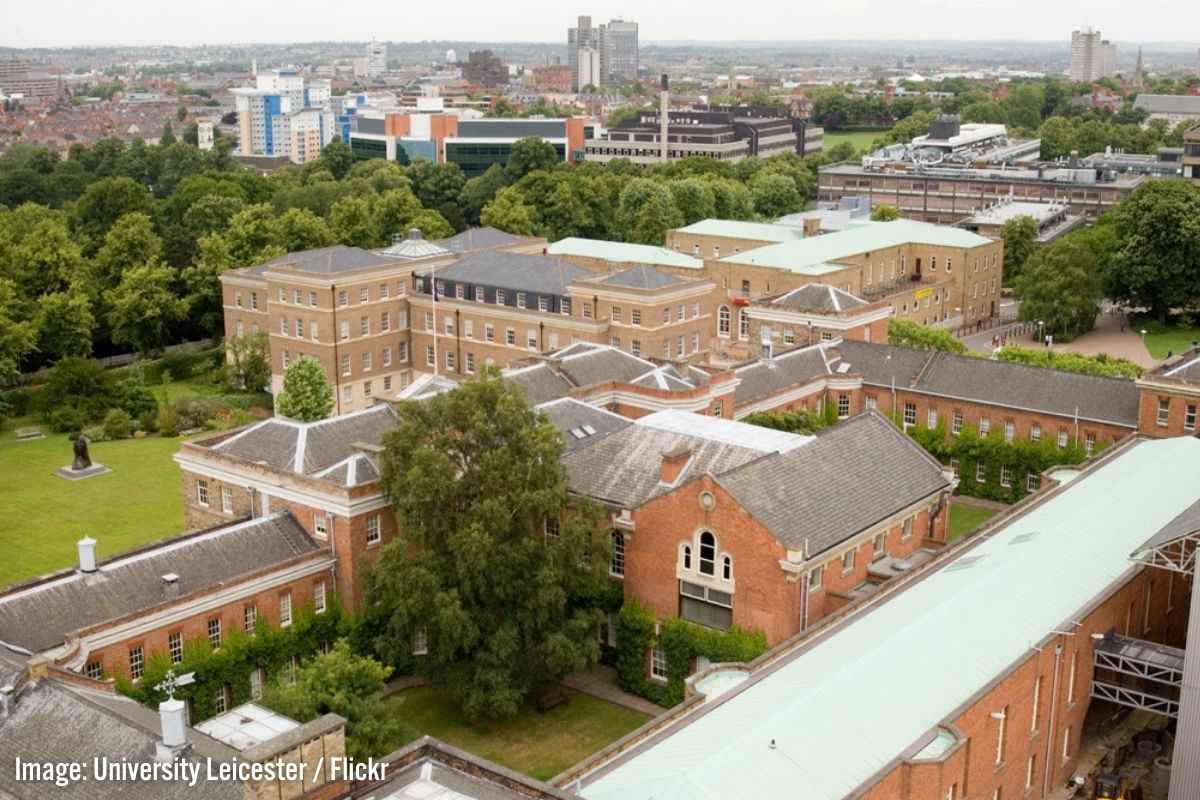
The 2020/21 academic year has been tough on all staff members, at every university. Workloads were already at record highs, and were made far worse by the half-baked, poorly explained, and rushed transition online.
This shift created huge disruption, with staff now struggling to keep up with workloads. The quality of their work – and thus of student education – is suffering as a result.
The executive board and Vice Chancellor at Leicester University have been particularly incompetent, mismanaging the university and threatening jobs.
We spoke to a local UCU member to understand the feelings of staff on campus, and to learn more about events at the University.
Disputes
We were told that the relationship between management and workers at the university has been “pretty poor” for a long time.
“I’ve only been involved in union politics for about six years,” the Leicester UCU member began. “And, you know, throughout that period, relationships have only gotten worse. [They’ve] reached a new low at the moment.”
“For the past three years, I think we’ve been involved in six major disputes – two or three nationally, and two locally. The last local dispute was in 2018, where again, there were mass redundancies [threatened].” And jobs are once again being threatened now.
Manipulation
145 jobs across five different departments and three professional services units are currently under threat. As well as this, the university is clamping down on staff dissent, with draconian attacks on free speech.
The so-called ‘Dignity and Respect Policy’, though ostensibly in place to help maintain a welcoming working environment, is cynically and bureaucratically being used to do the exact opposite!
Staff who take to social media to air their grievances about management are instead monitored and punished – as demonstrated by the current case of the university stripping an 81-year old professor of his title for critical social media posts.
Sadly, this is nothing new, with the worker we spoke to saying that “the policy has been used like this for several years, actually”.
Cynical manoeuvres by management are not limited to this. Under the guise of ‘decolonisation’, many degree programmes – such courses covering medieval or modern contemporary English literature – are being cut.
This ‘wokewashing’ is a manipulative attempt to make attacks on staff seem progressive. Furthermore, it undermines real demands and efforts to fight racism on campus.
This isn’t the end of it, however. The ‘Four Fights’ struggle has been ongoing. And university staff have been offered an insulting 0% pay increase during this difficult period.
Bankruptcy
The problems for UoL do not end there. “The university is arguably on the verge of bankruptcy, though he [VC Canagarajah] denies it,” the local UCU member told us. “The university is only £2 million above the threshold to be classed as a going concern.”
The university now only has one month of cash in reserves. It has failed to renegotiate with multiple creditors, and has just taken out another loan from the Bank of England for £60 million, which will need to be paid off within a year.
“Only two other universities have needed to access this loan,” the UCU comrade added.
Management are clearly incapable of acting in the interests of staff or students; or even of running a university. All the while, they sit on salaries seven times that of an average worker.
“We spend £2 million a year on senior managers and the Executive Board,” the UCU interview remarked.
There are 65 different individuals who are on salaries over £100,000. All the while, jobs are on the line and the university’s debts are climbing. Management are clearly acting in nobody’s interests but their own.
Change
None of this is in the interests of staff or students. Neither are the hostile environment policies that staff are obligated to enforce, acting like border agents on campus. Neither are cuts to library staff, nor the enormous £1.2 million cut to library funds.
These decisions are hugely detrimental. They are the result of the marketisation of education: running universities like businesses; treating education as a commodity, and students as consumers.
Indeed much of the decision making within universities is outsourced to private think-tanks! The Knowledge Partnership and dataHE have both provided data to the university to advise on which programmes and jobs to cut.
This management may be incompetent, lining their own pockets while the university goes under; but it’s important to note that the problem isn’t individual. And the solution isn’t just a new set of management.
Simply replacing management without changing the structure of the university will achieve nothing. The problems come from an undemocratic executive board, seeking to put revenue first, and staff and students second. This is what must change.
Strike
The Leicester UCU branch voted No Confidence in the VC and Executive Board in January, and voted overwhelmingly for action in a consultative ballot.
”[People] are so angry and they’re expressing this anger. So I think the mood is pretty militant, pretty angry. You know, our consultative ballot, which we concluded two weeks ago, we’re well over [the] 50% legal threshold for strike action. About two thirds, 67%, [of staff who voted] in favour of strike action. 79% in favour of action short of a strike.”
Workers were balloted for strike action from March 31 to April 14. And – despite the ballot lasting less than a fortnight and including a 4-day bank holiday weekend – 56% of members voted in the ballot, with 70% of those voting for strike action and 84% voting for action short of a strike.
Increasing resistance to management and the mandate for industrial action poses the question, however, of what steps should be taken from here. Indeed the militant mood is increasingly apparent, as the workers at Leicester UCU have pushed for the union as a whole to greylist the university; in their words, a “serious sanction”.
Students, too, have voted no confidence in VC Canagarajah and the rest of the Executive Board. This provides staff and students with a unique opportunity to work together to fight for radical demands around staff and student control of the universities – such as control over finances, and for key decision-making power to be in the hands of staff and students.
Only then will the protection of vital jobs be prioritised, with extra staff hired – without loss of pay – in order to evenly spread and reduce workloads.
Fightback
Given the state of the university’s finances, however, local students and workers need to be prepared to campaign to secure funding.
The money exists in society to adequately fund all universities. The problem is that this wealth sits in the bank accounts of giant monopolies and billionaires.
Students and staff should organise through their respective unions, and put pressure on the broader labour movement to campaign for the funding of the entire higher education sector through the expropriation of the big banks and monopolies.
Staff have made fantastic efforts fighting back against management. And the efforts of the student body are encouraging also. A key next step in this fightback is to now forge links with other public sector workers who face similar attacks on their pay and conditions, in order to organise and mobilise for a one-day public sector general strike.
This will clearly demonstrate who is really vital to the running of society: not the vice chancellors and bosses, but the lecturers, cleaners, doctors, and nurses – the workers.

